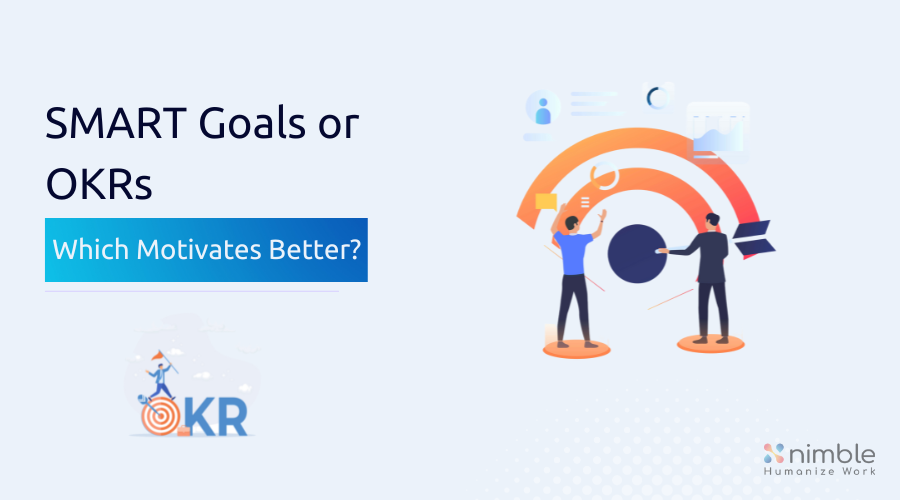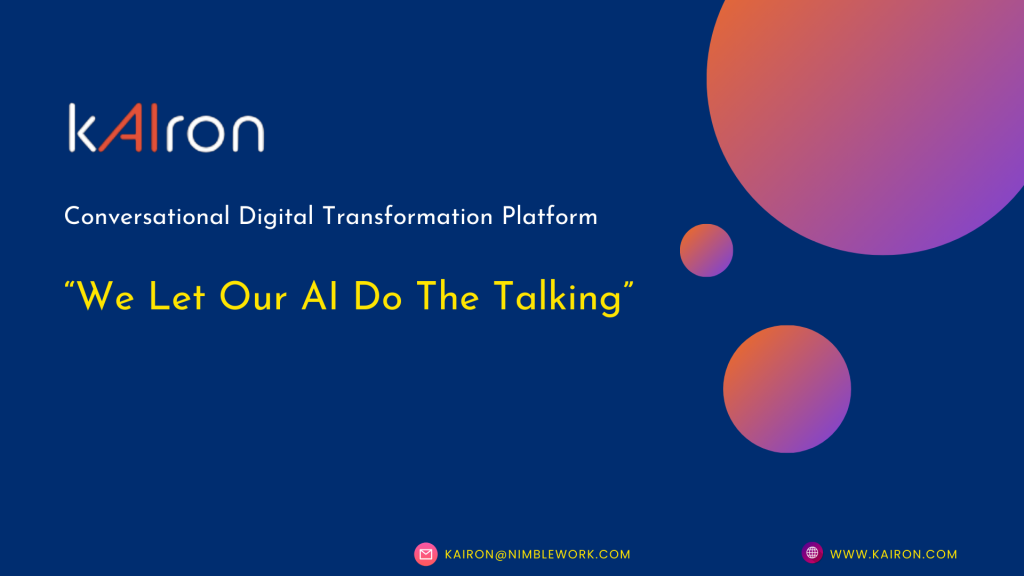OKRs vs. KPIs: Navigating the Metrics Maze – Differences, Examples, and Real-World Applications
Explore OKRs vs. KPIs: Uncover differences, examples, and real-world insights. Elevate your goal-setting and performance measurement strategies.

OKRs — objectives and key results — are hot.
A kingdom divided against itself cannot stand, and OKRs help people across your whole organization to align around the same objectives. And that’s exactly where OKRs shine.
However, in business, as in life, there’s no such a thing as a silver bullet. OKRs aren’t the exception.
Setting OKR goals is somewhat of a hot potato.
The OKR framework argues for setting “impossible” goals because doing so gets you farther than you would get with more realistic ones.
There are some real risks to that approach and mindset.
Setting challenging, virtually unachievable goals, can get you farther but they can just as easily have detrimental effects on the people who are expected to get as far as possible towards them.
So, what are you to do?
Adopt the OKR framework fully and set unachievable OKR goals, or use the framework but set more realistic, SMART, goals?
Let’s find out by examining traditional goal setting, how people respond to goals in general and what that means for OKR targets.
Let’s start with SMART goals.
You’ve probably heard of SMART goals or SMART objectives, since it’s been a while since this term entered the public Zeitgeist. SMART was first introduced by George T. Doran in a paper for the 1981 issue of Management Review (AMA Forum).
If you’re not familiar with SMART goals, or need a quick refresher, here it comes. SMART is an acronym that stands for Specific, Measurable, Achievable, Relevant and Timely.
Let’s see each one in turn.
How many people you know start the year with vague resolutions like “I’ll eat healthier” or “I’ll study more” and then, by February, are back to business as usual?
That’s because such resolutions are vague and imprecise.
“I’ll eat a healthy meal 3 times a week” and “I’ll study 2 hours a night on weekdays” are specific
In the same vein, you want a goal that allows you to measure your progress towards your goal as it helps you to stay motivated on your journey.
In the original definition, the A stood for Assignable. That is, there’s a clear sense of who’s responsibility that goal is.
Nowadays, most people define the A as Achievable, Attainable, or Appropriate.
Before setting a goal, you want to analyze whether you have the necessary resources to achieve it, if others in the past have done it, and so on.
The idea is that it’s demotivating to set goals that are out of reach.
How’s that for a complete 180° on setting goals according to the OKR framework?
Regardless of everything else, you want your goals to be relevant.
The question to answer is whether the goal you have in mind is relevant enough for you to commit the necessary time, effort and money to achieve it, and to do so now.
Also called time-bound or time-related.
You want your goals to have a start and end date to create a sense of urgency that’ll help to motivate you to continue making progress.
Having covered SMART and what goals do and don’t achieve, let’s dive into the OKR framework.
According to OKR you want to define objectives and, for each objective, a number of key results.
An objective is a high-level goal.
Key results are specific, measurable outcomes.
Targets are specific values you want to achieve for each key result. They are the OKR goals.
Importantly, the OKR framework says that targets should be ambitious and even unachievable, so they stretch people in the organization.
The idea is that by setting unachievable targets, people will go beyond what they think is possible.
John Doerr, author of “Measure What Matters: How Google, Bono, and the Gates Foundation Rock the World with OKRs”, recommends that an organization should aim for 70% as the success rate for key results. 60% is also a common figure.
The idea is that, if the organization is consistently reaching 100% of their targets, they’re essentially not trying hard enough, and the goals need to be re-evaluated.
What you might wonder, then, is: does setting unachievable targets even make sense at the end of the day? Wouldn’t it be easier to just set the 60% or 70% as the target to reach?
The answer is complicated and mainly depends on the extent to which you agree with ORK’s premises.
On the “yes” camp, people would argue that knowing that reaching 60%/70% of the key results is acceptable would reduce the psychological burden potentially caused by the super-ambitious, unachievable goals.
Others would answer “no” because, according to them, one of OKR’s core premises isn’t completely true.
That premise is the expectation that having a lower, unambitious goal would make people “take it easy” as soon as the goal is reached. According to people on the “no” camp, many people are motivated by aspects other than goals and key results, and those would keep pushing.
As you’ve seen, the answer to the question of whether setting “impossible” goals make change is complicated, to say the least.
For the sake of the argument, though, let’s assume that the answer is yes. Yes, OKRs’ ambitious goals make good business sense.
But do they make human sense?
In other words: when it comes to how people respond to goals, do OKR targets and their inherent non-achievability, exacerbate or alleviate psychological effects of goals in general?
The answer, again, is complicated.
One could argue they can do both. Let’s analyze this through the lenses of motivation and achievability.
People are different in how they respond to incentives.
Think about deadlines. There are people who thrive when they have a looming due date. For others, the shadow of the deadline approaching causes such a high level of anxiety that they simply paralyze.
The same happens with goals and targets.
While for some people, targets (specially ambitious ones) are excellent tools to keep them energized and excited about their work, for others targets represent fear, loss of confidence and anxiety.
Where the former group thrives, the latter paralyzes.
Let’s talk more about the potential harms caused by unachievable targets.
For people that don’t naturally thrive under targets and goals, over ambitious goals can cause anxiety attacks, burnout, and even an acute sense of helplessness and demotivation.
It’s as though they’re saying: “why even try when we don’t have a chance of reaching this target?”
However — and that’s the bit that may surprise you —overambitious goals can also harm those people that would typically thrive under them.
I talk about people perceived as impatient, ambitious and high achievers — the ones who usually match with the “Type A” personally from Type A and Type B personality theory.
These people can be too motivated — their relentless pursuit endangers their health and well-being.
It’s not all doom and gloom when it comes to OKR. On the contrary: there’s plenty to be said about the benefits of this framework.
First, let’s talk about how objectives differ from mere goals, and why they’re superior.
One of the problems with goal setting is that they’re often arbitrary, chosen for simplicity and measurability rather than what’s important.
Quite often they bear little relation to what really generates value for an organization, let alone to its values, principles and purpose.
On the other hand, targets within OKRs have a clear connection to an organization’s objectives. And do so at every level in the organization.
It’s how OKRs help promote alignment: when people can see how targets are linked to the company’s mission, they have a clear reason to work towards them.
Purpose motivates humans. And that doesn’t change when someone goes to work.
So, in a way the OKR framework is a blessing and a curse. The blessing being the connection with the objectives, the curse being the setting of virtually impossible targets.
On the one hand, the latter can inspire and motivate to stretch, grow, and achieve more.
On the other, they can intimidate and cause psychological distress — even for people who normally thrive when they have goals to pursue.
The inevitable question then becomes: shouldn’t we just forgo this “unachievable” thing and concentrate on the other parts of the OKR framework?
OKR purists are now certainly gathering their pitchforks and torches. How could we drop such a significant part of the framework and claim we’re still using it?
I myself am more of a pragmatist.
I believe the framework has to work for you and your organization, and not the other way around. If, in the process of adjusting the framework to your needs, you reach a point where it’s barely recognizable, so be it.
It’s essential that you consider the values of your organization and the people in it.
Take the stereotypical person that works on finance, for instance: driven, ambitious, impatient — they’re likely to respond well to ambitious targets.
Also, consider that in some fields, the definition of success can be hard to quantify and measure.
How to define ambitious targets for an orchestra or a day-care center?
At the end of the day, it’s your responsibility to understand your people.
And it’s your and their joint prerogative to define the objectives, key results and target levels that work for all of you.
Making OKR targets work for everyone, regardless of personality types, organization size, and industry is a tough challenge.
But it’s not impossible and these tips will help you set healthy OKR targets.
First of all, to avoid most of the negative effects, like cutting corners, gaming of metrics, and over-working, it’s crucial that you do not tie OKR targets to specific financial outcomes — think bonuses, performance reviews, promotions, and so on.
Secondly, to allow your organization to thrive as a whole, and avoid the toxicity that accompanies pitting people against each other, it’s essential to include key results that promote collaboration. Collaborative targets boost morale, can increase the exchange of ideas—and thus innovation—and increase good will among your people.
Thirdly, when it comes to tracking targets, it’s vital to be transparent at all levels. Don’t just expect transparency to flow upward through your organization, extend it downward as well. Tools that allow everyone to see how all parts of your organization are progressing, help you do just that.
Last but not least: avoid top-down imposition of targets. Foster and welcome input and collaboration from everyone. People value autonomy, and they value purpose. If people don’t have a say in the targets that will dictate a good portion of their working lives, there’s no hope they will be motivated by them.
Saying the goal setting is hard would be an understatement. It’s a tough challenge that can backfire in a myriad of ways.
The OKR framework offers alignment and focus for organizations, but its insistence on unachievable targets often falls flat for many types of personalities and companies.
OKRs are a double-edged sword: use them wisely, cautiously, and always factoring in the characteristics of your organization and your people.
Last, but not least, remember to research, find out and leverage tools that can help on your journey, such as Nimble OKRs.

OKRs 101
OKRs vs. KPIs: Navigating the Metrics Maze – Differences, Examples, and Real-World Applications
Explore OKRs vs. KPIs: Uncover differences, examples, and real-world insights. Elevate your goal-setting and performance measurement strategies.
What is an OKR goal? What is an OKR objective?
Implementing OKRs can be a great way for organizations to create organization-wide goals that keep motivation and alignment high, and in this post, you’ll learn more about this framework.
Tracking OKRs: Where the Real OKR Magic Happens
Implementing OKRs: 11 Do’s and 8 Don’ts for OKR Success
OKR Implementation Guide: 8 Tips to Ace Your OKRs
OKR Targets and Psychological Safety: At Odds or a Match Made in Heaven
SMART Goals or OKRs Targets for Motivational Power?
Join 150,000+ Pioneers, Leaders & Mavericks receiving our updates!

